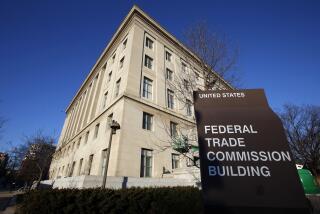Accounting Board Sees New Rule Proposal by May 1
- Share via
Accounting rules makers made more progress Wednesday on new guidelines for the financing vehicles used by Enron Corp. to hide debts, a change that would force thousands of firms to add liabilities to their books by next year.
The Financial Accounting Standards Board’s proposed rules on “special-purpose entities” would cover the partnerships that Enron created, but their greatest effect would be on “synthetic leases” used by many companies to finance property, officials said.
FASB said Wednesday that it hopes to publish a draft of the rules changes by May 1, then ask for public comment for up to 90 days.
The board is calling for special-purpose entities to be included on a company’s balance sheet if less than 10% of the equity in an entity is from outside investors. Under existing rules, Enron was able to keep its partnerships off its books even though outsiders’ capital was less than 3% of the total.
But FASB officials say that, apart from a specific percentage of outside interest, special-purpose entities should have to be consolidated on companies’ books if it’s evident that the entities aren’t truly independent.
Special-purpose entities have long been used by many U.S. companies to finance projects in a way that allows tax benefits without visibly impairing balance sheets.
Critics have said that the practice allows companies to appear not to be responsible for financial obligations that may come back to haunt them.
In a synthetic lease arrangement, a financial institution sets up a special-purpose entity that borrows money to finance new construction or to purchase an existing building for a company. AOL Time Warner, for example, is financing construction of its new Manhattan headquarters with a synthetic lease arrangement set up by Bank of America Corp.
The entity holds the title and leases the facility to the company for the term of the lease, typically three to seven years, with the possibility for renewal.
Under FASB’s proposals, “The large majority of all synthetic lease” arrangements would have to be reflected on balance sheets, FASB Chairman Edmund Jenkins said.
“If the company could eventually be on the hook, then the liability should be fully disclosed on the balance sheet,” said Victor Cunningham, research chief for the Olstein Financial Alert stock mutual fund. “If we learn anything from Enron, it should be that this is not the kind of surprise that investors should have.”
Previous proposals to change the rules have been opposed by accounting firms, companies and even members of Congress, on the grounds that they would be difficult to implement. This time, FASB has broader support, particularly from lawmakers, Jenkins said. Twelve congressional committees are holding hearings on Enron’s bankruptcy.
“We will have full, open due process and adequate opportunity for all of our constituents to comment,” Jenkins said.
More to Read
Inside the business of entertainment
The Wide Shot brings you news, analysis and insights on everything from streaming wars to production — and what it all means for the future.
You may occasionally receive promotional content from the Los Angeles Times.










